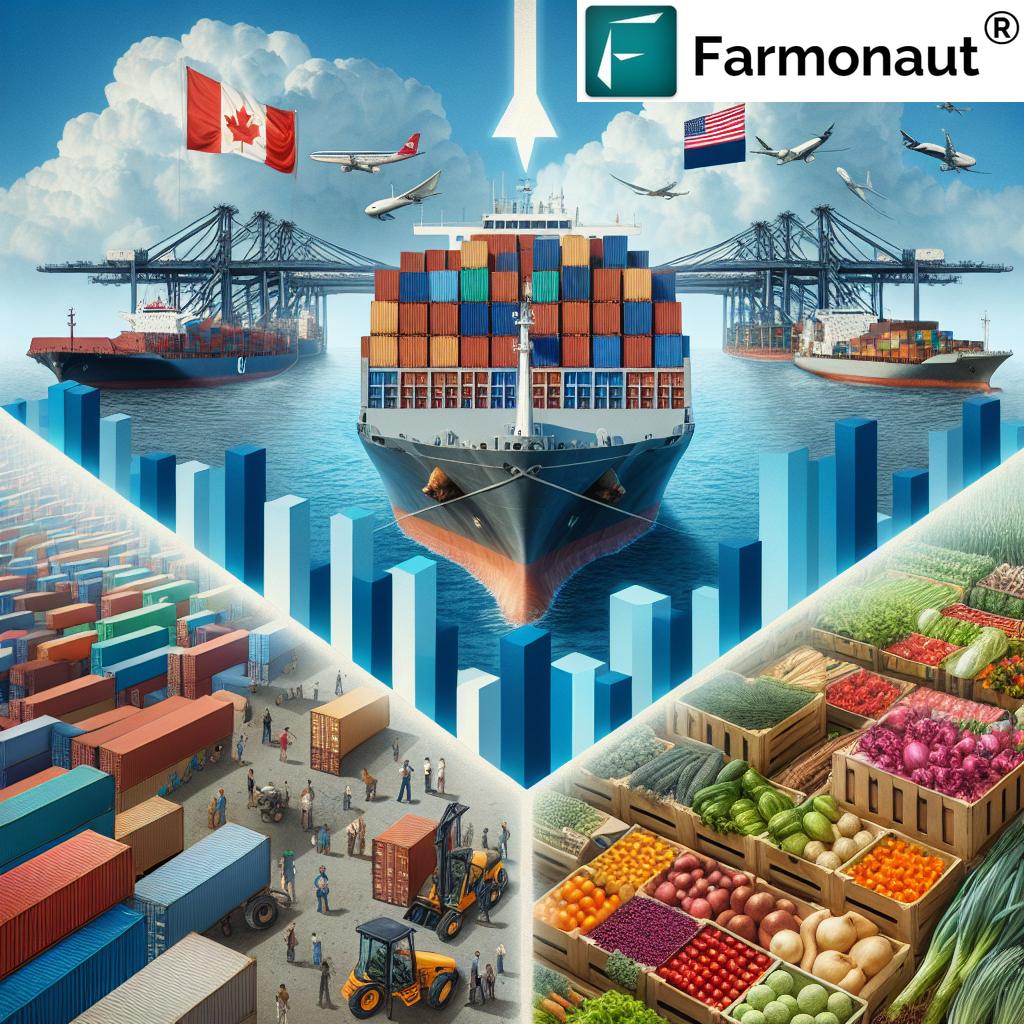North Carolina Farmers Face Economic Challenges: How International Tariffs and Trade Policies Impact Local Agriculture
“North Carolina farmers face rising costs, with fertilizers, plastics, and diesel fuels impacting crop production across 8.4 million acres of farmland.”
In the heart of the American South, North Carolina’s agricultural sector finds itself at a crossroads. As international trade policies and tariffs reshape the global economic landscape, our local farmers are experiencing the ripple effects firsthand. We, as members of the agricultural community and concerned citizens, must understand the complex interplay between federal legislation, international trade, and the economic realities faced by farmers in Greensboro and beyond.
The Changing Landscape of North Carolina Agriculture
North Carolina’s rich agricultural heritage has long been a cornerstone of the state’s economy. From the sprawling tobacco fields to the diverse vegetable farms, our state’s agricultural prowess is undeniable. However, recent shifts in international trade policies have begun to alter this familiar landscape.
Daniel Johnson of the Piedmont Triad Farmers Market aptly summarizes the situation: “The fact of the matter is…human beings have to eat and we will never be able to factor out the importance of farmers in our daily lives.” This fundamental truth underscores the critical nature of our current economic challenges.

The Impact of International Tariffs on Local Farming
The introduction of new tariffs on international goods has set in motion a chain of events that directly affects our local agricultural community. These economic measures, designed to protect domestic industries, often have far-reaching consequences that extend beyond their intended scope.
For North Carolina farmers, the impact is multifaceted:
- Rising Input Costs: Farmers are experiencing increases in the prices of essential agricultural inputs.
- Equipment Price Hikes: Tariffs on steel and aluminum are driving up the cost of farm machinery.
- Fuel Price Volatility: Fluctuations in diesel prices are adding uncertainty to operational costs.
- Market Access Challenges: Retaliatory tariffs from other countries may limit export opportunities for NC farm products.
As we delve deeper into these issues, it becomes clear that the relationship between local farming and global trade is more intricate than ever before.
The Role of Technology in Navigating Economic Challenges
In these challenging times, technology offers a beacon of hope for farmers seeking to optimize their operations and mitigate economic pressures. Platforms like Farmonaut provide innovative solutions that can help farmers make data-driven decisions to improve efficiency and reduce costs.
Farmonaut’s satellite-based farm management solutions offer real-time crop health monitoring, allowing farmers to make informed decisions about resource allocation. By leveraging these advanced technologies, North Carolina farmers can potentially offset some of the economic challenges posed by international trade policies.
The Economic Ripple Effect: From Global Policies to Local Markets
The impact of international trade policies extends far beyond the farm gate. As tariffs reshape the economic landscape, we’re witnessing a domino effect that touches various sectors of North Carolina’s economy.
“Tariffs on steel and aluminum exports could affect 20% of North Carolina’s manufacturing GDP, including vehicle and construction industries.”
This startling statistic highlights the interconnected nature of our economy. The Triad region, known for its robust manufacturing sector, faces potential challenges as tariffs on steel and aluminum exports come into play. Industries such as vehicle production and housing construction, which are vital to the region’s economic health, may experience increased costs and operational hurdles.
The Consumer Perspective: How Trade Policies Affect Your Grocery Bill
As we examine the broader economic impact, it’s crucial to consider how these changes affect the average North Carolina consumer. The relationship between international trade policies and local shopping habits is more direct than many realize.
- Potential Price Increases: As farmers face higher input costs, these may be reflected in consumer prices for agricultural products.
- Shifts in Product Availability: Changes in trade patterns could affect the variety of products available in local markets.
- Quality Considerations: Economic pressures may influence farming practices, potentially impacting product quality.
Understanding these connections empowers consumers to make informed decisions and appreciate the complex journey from farm to table.

Navigating the New Economic Landscape: Strategies for North Carolina Farmers
In the face of these economic challenges, North Carolina farmers are demonstrating remarkable resilience and adaptability. Here are some strategies being employed to navigate the changing landscape:
- Diversification of Crops: Some farmers are exploring new crop varieties that may be less affected by international trade fluctuations.
- Adoption of Precision Agriculture: Technologies like those offered by Farmonaut are helping farmers optimize resource use and reduce waste.
- Exploration of Local Markets: Many farmers are strengthening connections with local consumers and restaurants to reduce dependence on international markets.
- Collaborative Efforts: Farmer cooperatives and shared resource programs are gaining traction as ways to distribute costs and risks.
These strategies highlight the innovative spirit of North Carolina’s agricultural community and their commitment to adapting to economic challenges.
The Role of Government and Policy Makers
As we navigate these economic challenges, the role of government and policy makers becomes increasingly crucial. Federal and state legislators are faced with the complex task of balancing international trade relationships while protecting the interests of local farmers and industries.
Key areas of focus for policy makers include:
- Trade Negotiations: Ongoing discussions with international partners to mitigate the impact of tariffs on NC agriculture.
- Support Programs: Development of assistance programs to help farmers adapt to changing economic conditions.
- Infrastructure Investment: Improving transportation and logistics networks to enhance market access for NC agricultural products.
- Research and Development: Funding for agricultural research to develop more resilient crop varieties and farming techniques.
The decisions made in legislative chambers have profound implications for the future of North Carolina’s agricultural sector.
The Environmental Dimension: Balancing Economics and Sustainability
As we discuss the economic challenges faced by North Carolina farmers, it’s important to consider the environmental implications of changing agricultural practices. The push for efficiency in the face of economic pressures must be balanced with sustainable farming methods to ensure the long-term health of our agricultural lands.
Farmonaut’s technology offers solutions that align economic efficiency with environmental stewardship. Their satellite-based crop monitoring can help farmers optimize resource use, potentially reducing the environmental footprint of agricultural operations while maintaining productivity.
The Future of North Carolina Agriculture in a Global Economy
As we look to the future, the resilience and adaptability of North Carolina’s agricultural sector will be put to the test. The challenges posed by international trade policies and tariffs are significant, but they also present opportunities for innovation and growth.
Key trends to watch include:
- Technological Integration: Increased adoption of precision agriculture and data-driven farming practices.
- Market Diversification: Exploration of new markets and crop varieties to reduce economic vulnerability.
- Sustainable Practices: Growing emphasis on environmentally friendly farming methods that also improve economic efficiency.
- Community-Supported Agriculture: Strengthening connections between farmers and local consumers.
The path forward will require collaboration between farmers, policy makers, technologists, and consumers to create a resilient and thriving agricultural sector in North Carolina.
Economic Impact Comparison
| Agricultural Sector | Pre-Tariff Costs | Post-Tariff Costs |
|---|---|---|
| Fertilizer Prices | $400/ton | $480/ton |
| Steel-based Equipment | $50,000/tractor | $57,500/tractor |
| Aluminum Irrigation Systems | $10,000/system | $11,500/system |
| Fuel Costs | $3.00/gallon | $3.45/gallon |
| Crop Export Value | $1.5 billion | $1.35 billion |
| Local Consumer Prices | Baseline | 5-10% increase |
This table illustrates the potential economic impact of tariffs on various aspects of North Carolina’s agricultural industry. It’s important to note that these figures are estimates and may vary based on specific circumstances and market conditions.
Leveraging Technology for Agricultural Resilience
In the face of economic challenges, technology emerges as a powerful ally for North Carolina farmers. Platforms like Farmonaut offer innovative solutions that can help offset some of the financial pressures caused by international trade policies.
Earn With Farmonaut: Affiliate Program
Earn 20% recurring commission with Farmonaut’s affiliate program by sharing your promo code and helping farmers save 10%. Onboard 10 Elite farmers monthly to earn a minimum of $148,000 annually—start now and grow your income!
By utilizing Farmonaut’s satellite-based crop health monitoring and AI-driven advisory systems, farmers can make data-informed decisions that optimize resource use and potentially reduce operational costs. This technological edge can be crucial in maintaining competitiveness in a challenging economic environment.
The Road Ahead: Collaboration and Innovation
As we conclude our exploration of the economic challenges facing North Carolina farmers, it’s clear that the path forward requires a collaborative approach. Farmers, policy makers, technologists, and consumers all have a role to play in shaping a resilient and prosperous agricultural future for our state.
Key takeaways include:
- The interconnected nature of global trade and local agriculture
- The importance of adaptive strategies in the face of economic challenges
- The potential of technology to drive efficiency and sustainability in farming
- The need for supportive policies that balance international trade with local agricultural interests
By working together and embracing innovation, we can ensure that North Carolina’s agricultural sector not only survives but thrives in the face of economic challenges posed by international tariffs and trade policies.
Farmonaut Subscriptions
Frequently Asked Questions
Q: How do international tariffs directly affect North Carolina farmers?
A: International tariffs can increase the cost of agricultural inputs like fertilizers and equipment, while potentially limiting export opportunities for NC farm products due to retaliatory tariffs from other countries.
Q: What strategies are North Carolina farmers using to adapt to these economic challenges?
A: Farmers are diversifying crops, adopting precision agriculture technologies, exploring local markets, and forming cooperatives to share resources and distribute risks.
Q: How might consumers in North Carolina be affected by these trade policies?
A: Consumers may see increased prices for agricultural products, potential changes in product availability, and possible shifts in product quality due to economic pressures on farmers.
Q: What role does technology play in helping farmers navigate these challenges?
A: Technologies like Farmonaut’s satellite-based farm management solutions help farmers optimize resource use, reduce waste, and make data-driven decisions to improve efficiency and potentially offset some economic pressures.
Q: How are policy makers addressing these economic challenges for farmers?
A: Policy makers are engaging in trade negotiations, developing support programs for farmers, investing in infrastructure, and funding agricultural research to help the sector adapt to changing economic conditions.
For more information on how technology can help address these challenges, visit Farmonaut’s API or check out their API Developer Docs.







